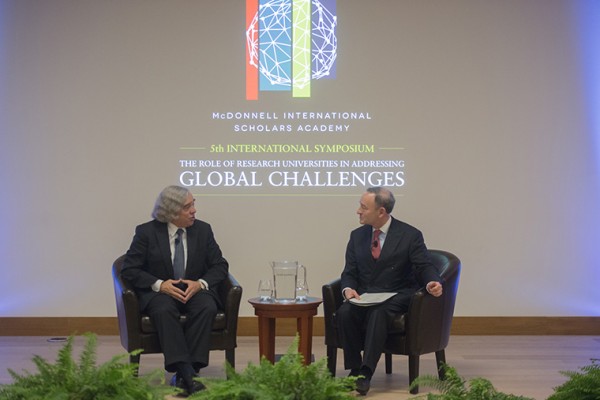The cat’s meow: Genome reveals clues to domestication
Cats and humans have shared the same households for at least 9,000 years, but we still know very little about how our feline friends became domesticated. An analysis of the cat genome by School of Medicine researchers reveals some surprising clues. Pictured is a blue Abyssinian cat.
Ferguson and beyond: Davis to discuss race and the community
The Brown School Policy Forum at Washington University in St. Louis presents “The University, the Community, and Race” at 4 p.m. Monday, Nov. 10, in Brown Hall’s Brown Lounge. The talk, part of the “Ferguson and Beyond” lecture series, will be given by Larry E. Davis, PhD, dean of the School of Social Work at the University of Pittsburgh and director and founder of its Center on Race and Social Problems.
When I’m 64: Imagining the future of aging
Today’s freshmen students have a 50 percent chance of living to see their 100th birthdays. They are in the middle of a demographic revolution that will shape every aspect of their lives. A new interdisciplinary course for freshmen introduced this fall, “When I’m Sixty-Four: Transforming Your Future,”
aims to prepare students for this aging revolution and to encourage
them to examine their present and future lives in more detail.
Himalayan Viagra fuels caterpillar fungus gold rush
Overwhelmed by speculators trying to cash-in on a prized medicinal fungus known as Himalayan Viagra, two isolated Tibetan communities have managed to do at the local level what world leaders often fail to do on a global scale — implement a successful system for the sustainable harvest of a precious natural resource, suggests new research from Washington University in St. Louis.
Addressing global challenges: The role of research universities
Representatives and leadership from Washington University and the 28 McDonnell International Scholars Academy institutions came together with policymakers, researchers, students and corporate partners for the recent Fifth International Symposium on “The Role of Research Universities in Addressing Global Challenges.” The symposium, sponsored by the McDonnell Academy, focused on how interdisciplinary research and education collaboration can lead to innovative solutions for the world’s most pressing problems
Three Egyptian mummies receive CT scans
Washington University School of Medicine recently teamed up with the Saint Louis Art Museum and the university’s Mildred Lane Kemper Art Museum to scan some very unusual patients: three Egyptian mummies.
World faces looming food and water challenges, say academic researchers
Climate change, water shortages and the loss of
farmland to pollution and urban sprawl are making it increasingly
difficult for farmers to feed the world’s growing population,
agricultural scholars from four continents said this week at an
international symposium held at Washington University in St. Louis.
Major Indo-U.S. Advanced Bioenergy Consortium launches
The government of India’s Department of Biotechnology,
Indian corporate leaders and Washington University in St. Louis have
invested $2.5 million to launch the Indo-U.S. Advanced Bioenergy
Consortium for Second Generation Biofuels (IUABC). The goal of the center is to increase biomass yield in
plants and algae, enabling downstream commercial development for
cost-effective, efficient and environmentally sustainable production of
advanced biofuels.
‘Long tail’ thinking can help eliminate health disparities
“Long tail” thinking — a strategy employed by many new businesses — might yield
greater progress the field of public health by eliminating health disparities, according to a
study from the Brown School at Washington University in St. Louis led by Matthew W. Kreuter, PhD.
Study: Most respond well to genetic testing results
People at high risk for psychological distress respond positively to receiving results of personalized genetic testing, according to new research at Washington University School of Medicine in St. Louis. More than 60 percent of subjects in the genetic study wanted information about their test results, and 95 percent said they appreciated receiving the information, regardless of whether the results were good or bad news.
Older Stories

